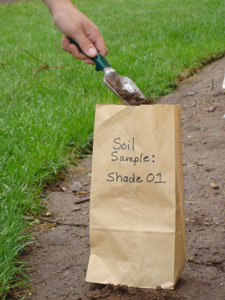|
Soils and Composting | Soil Testing | Soil Type | Soil Improvement | Composting |
Links to external web pages are followed by the source’s name in parentheses.
Why Is Soil Testing Important?
Plants differ with respect to their soil pH and nutrient needs. Soils vary considerably in their capability to meet a plant’s nutritional needs depending on factors such as soil parent material, soil texture and structure, the amount of organic matter, biological activities, regional climate, and current growing conditions. Taking a soil test and using the recommendations that come with it will help plants receive adequate amounts of nutrients needed for plant growth. Other benefits, such as minimizing fertilizer runoff into the environment and cost savings from applying only what your plants need, are also good reasons for taking a soil test.
Soil Sampling
The results of your soil test will be only as good as the sample you collect. Follow the instructions from the soil testing laboratory you are using. Failure to take a soil sample according to the laboratory specifications is likely to result in inappropriate recommendations for your garden or yard.
Find out more about soil sampling and reasons for taking a soil sample by reviewing:
- Soil Testing is an Excellent Investment (Ohio State University Extension).
- – Note: Soil testing laboratories in this publication are relevant for the Ohio area. To find a soil testing laboratory from your local region or state, type in your state and soil testing laboratory in a search engine, or find out if your local university has a soil testing laboratory.
Comparing Store-Bought Kits vs. Professional Services
Many garden centers have soil test kits that you can buy. Should you use a store-bought kit or a soil testing laboratory? Compare the advantages below:
| Advantages of store-bought and laboratory soil tests. | |
| Store-bought soil testing kits | Professional soil testing laboratories |
|
|
There are more accurate kits available through such companies as Hach and LaMotte but they may be expensive. If you are determined to use a home testing kit, we suggest you collect a sample, thoroughly mix it, and divide it into two sections. Test one with your kit and send the other half to a professional laboratory. If the results and the recommendations that come back from the laboratory are similar to those you have obtained with the home testing kit, continue to use your home testing kit.
A summary of research evaluating the accuracy of five commercially available soil test kits can be seen at:
- Accuracy of Some Home Soil Test Kits (HortTechnology, American Society for Horticultural Science).
Soil Testing Laboratories, Interpretations, and Recommendations
Each soil laboratory has its own tests, interpretations, and recommendations for the soil samples it analyzes. Use the following resources to find a soil testing laboratory near you:
- SOIL TESTING LABORATORIES IN NORTH AMERICA (American Horticultural Society) includes both university and non-university soil testing laboratories.
- University Related Plant Disease and Soil Testing Clinics (Maintained by the American Phytopathological Society). This pdf file contains state university soil testing laboratories and plant clinics listings.

